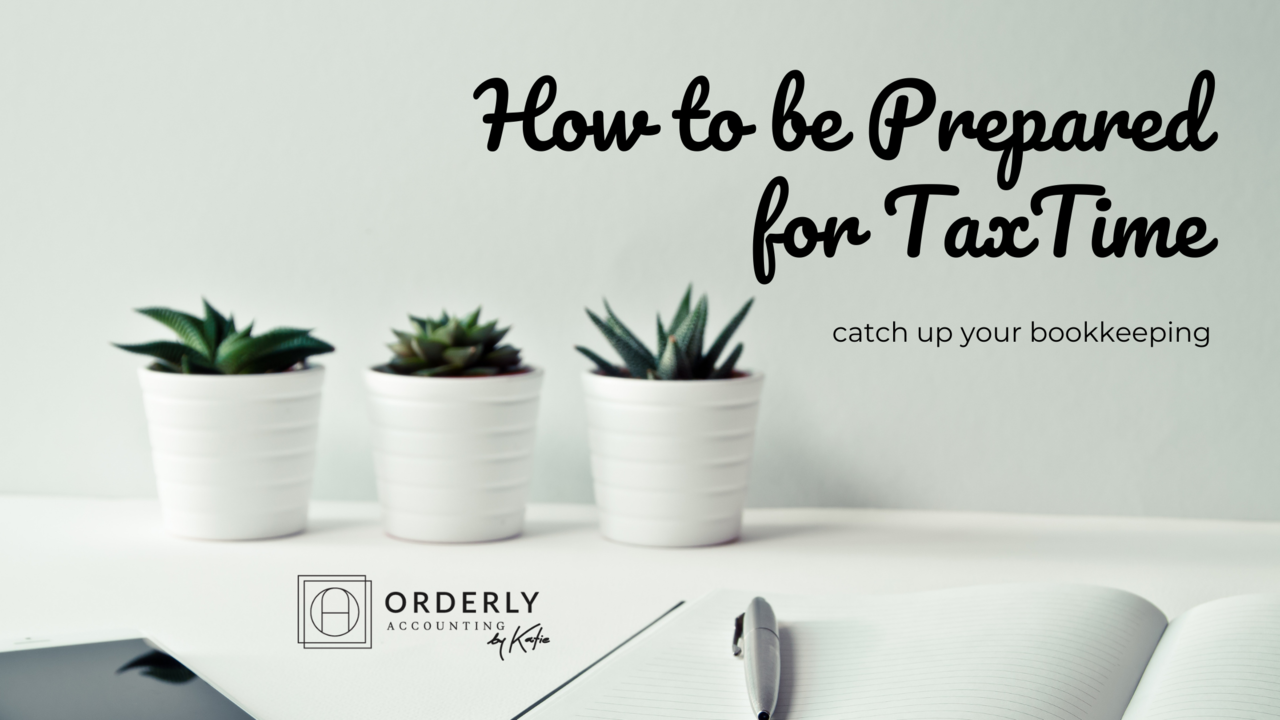How to Be Prepared for Tax Time: Catch up Your Bookkeeping
May 09, 2020
In this blog post we'll talk about how to be prepared for tax time.
To make things simpler, get your FREE Year-End Tax Checklist now to follow along.
Being prepared for tax time means taking several smart steps to ensure you're ending the year the right way and not just sorting through a shoe box of receipts in April.
Saving money the right way means planning ahead, and I'm here to walk you through this process and make it as simple as possible.
New Here?
Be sure to sign up for free monthly bookkeeping & tax reminders sent straight to your inbox to be sure you stay on track and never miss a deadline.
Also, check out the following blogs that help you take fear out of the numbers side of your biz, save money and stay out of trouble:
How to Use Your Business to Build Your Dream Life
12 Ways to Find More Money to Invest in Your Biz
How to Track Your Profits Simply
How to Increase Income by Setting a Simple Sales Strategy
Where to Start When Starting a Biz
How Being an S Corp Can Save You Money
How to Keep Your Small Biz Expenses Organized
Venmo for Business - Is It Bad?
Why I Worry About Today's Entrepreneurs
3 Things You Need to Know About Tax and Accounting as Your Own Boss
What does bookkeeping have to do with taxes?
Bookkeeping is simply a method of tracking your business income (also called sales or revenue) and your expenses (also called costs or deductions). Bookkeeping is essential for being prepared for tax time because it is a compilation of what gets reported on a tax return - income, expenses, and most importantly, profit or loss.
Profit is simply the difference between income and expenses and the formula is income minus expenses. If income exceeds expenses, you have a profit. If not, you have a loss.
At the end of the year, you pay taxes on your business profit, so knowing your profit helps you estimate if you will end up owing tax from the business and is the first step in strategically planning all of the steps to follow in the Year-End Checklist so you end up paying the least amount legally possible in taxes.
Make it simple by using a well designed system
If you don't already have a bookkeeping system in place or you have fallen behind, then it's time to play catch up.
I always recommend two things to keep bookkeeping simple:
1. Keep your business and personal finances separate. The most simplistic way to do this is to open a business only checking account and run all business income and expenses through this account.
2. Use a system for bookkeeping. My personal preference is to use an online bookkeeping software like Xero or QuickBooks Online (Simple Start is usually the subscription I recommend). However, if you're looking to play catch up for the year, a simple spreadsheet may be best, especially if you've been mixing up your business and personal expenses.
For next year, however, I would definitely recommend opening up a separate business checking account and starting fresh in January with a powerful system like Xero or Quickbooks.
If you're looking to save time and hassle, my Profit and Loss Workbook that comes with my best selling Small Biz Starter Kit is a perfect fit for you.
It is built in Google Sheets so you don't even need to have Excel on your computer. But if you do, you can simply export it to an Excel Workbook if you prefer. It has one tab per month and all you have to do is enter in sales and expenses and give each expense a category and the workbook will do the rest for you.
Each month it will give you a profit or loss summary by expense category, and it will even auto populate a summary per quarter and one for the year to give you the quarterly profit and loss as well as the annual profit or loss.
Watch the video here to view the Profit and Loss Workbook being demoed.
What categories to use for business expenses
People often struggle with knowing what categories to use for business expenses. I find it best to look at the IRS Form Schedule C where business income and expenses are reported.
Before I show you a screenshot of the form, let's discuss what business expenses even are. Simply put, they are any costs incurred in order to generate revenue. Special rules apply to a handful of categories like home office, auto, and meals and entertainment.
Below is a snippit of Form Schedule C that shows the categories the IRS gives you to fill in. If you still have questions about how to categorize a business expense, be sure to join The Profit Pursuit Community on Facebook where you can get your question answered as well as receive monthly tax and bookkeeping reminders and be the first to know about free trainings.
What's next?
Be sure to stay in touch and check out my free resources. Be sure to get your Free Year-End Tax Checklist to follow along for the rest of the trainings and join The Profit Pursuit Community on Facebook to get monthly tax and bookkeeping reminders, free trainings, and be supported in your profit journey.





